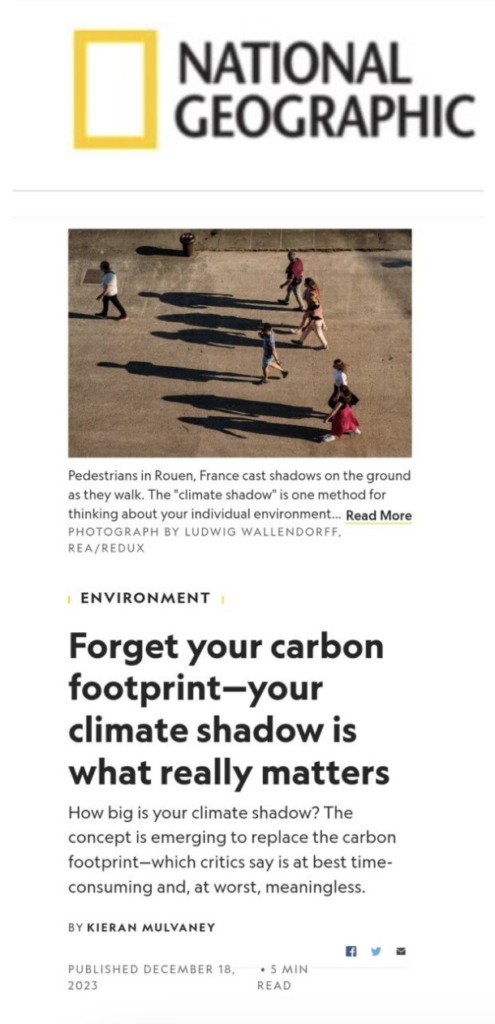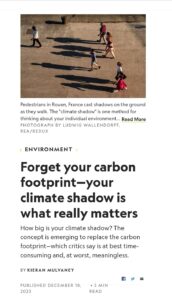https://www.nationalgeographic.com/environment/article/climate-shadow-carbon-footprint
By BYKIERAN MULVANEY
But critics argue that focusing on your carbon footprint is at best time consuming and at worst meaningless. Instead, the “climate shadow” has emerged as a more holistic alternative.
First coined by Portland, Oregon-based writer Emma Pattee, the climate shadow aims to paint a picture of the full sum of one’s choices—and the impact they have on the planet.
What is a climate shadow?
In an article she wrote in 2021, Pattee detailed her concept for measuring an individual’s impact: “[Your climate shadow is] a dark shape stretching out behind you. Everywhere you go, it goes too, tallying not just your air conditioning use and the gas mileage of your car, but also how you vote, how many children you choose to have, where you work, how you invest your money, how much you talk about climate change, and whether your words amplify urgency, apathy, or denial.”
The larger the shadow—the greater an individual’s impact on doing good for the planet.
While your carbon footprint may shrink if you place solar panels on your roof, for example, your climate shadow would, in contrast, grow when talking with your neighbors about your choices. Even the social impact of simply displaying solar panels would influence the size of your shadow. Studies show having neighbors with solar panels pressures nearby residents to install their own.
In other words, rather than incentivizing purely individual actions, your climate shadow grows when those actions inspire others, knowingly or otherwise.
The problem with a carbon footprint
By their nature, carbon footprint calculators highlight individual actions while ignoring the impact of large industries or the role governments play in limiting them. Critics of carbon footprint calculators argue, for example, that they have been coopted by oil companies to shift blame and attention away from them and on to everyday consumers.
“A carbon footprint is a quantitative metric measure of righteousness,” explains Katharine Hayhoe, chief scientist for The Nature Conservancy and a professor at Texas Tech University. “And people use it to feel good about themselves, which we all want to do when we feel fearful, scared, worried, and concerned. But then they turn it into a measure to judge other people.”
One especially problematic aspect of how a footprint is calculated is that many people may have larger carbon footprints because they have little choice: they may drive a lot because they live in an area with minimal mass transit, or they may subsist on meals that take a relatively large toll on the environment because they live in a food desert.
That imbalance bothered Pattee.
“What became clear to me is that so much of our carbon footprint is baked in by forces outside of our control,” she explains. “We don’t really control how our cities are laid out; we don’t control public transportation. We don’t even control what country we’re born into.”
Pattee argues that, by extending far beyond individual actions such as how much recycling we do or whether we use non-biodegradable coffee pods, a climate shadow more accurately reflects our broader impact. Greta Thunberg, she points out, would have made a positive impact had she decided to go vegan, but it would have been a lot smaller than it has been had she stopped there.
The combination of the individual and collective, of the tangible and intangible, appeals to Hayhoe, who was an early advocate of the climate shadow.
“People always are arguing and fighting over whether it’s individual changes or system wide changes that we need to fix climate change,” she says. “Whenever anybody asks me that, my answer is ‘yes.’ We do need individual action, but individual action is not enough.”
Reckoning with individual responsibility
If the notion of a climate shadow seems nebulous, that isn’t entirely by accident. The objective is not to create a climate shadow scorecard. Rather, Pattee describes it as “sharing my own spiritual and moral reckoning.”
It is, she argues, simply a way of thinking about how we live our lives in the middle of a climate crisis, and how we choose to live our lives for the betterment of ourselves and others.
Some environmentalists argue that, while imperfect, the carbon footprint can at least provide a framework for altering one’s behavior in a positive fashion.
Some environmentalists argue that, while imperfect, the carbon footprint can at least provide a framework for altering one’s behavior in a positive fashion. It’s better, the argument goes, to view a carbon footprint and a climate shadow as complementary rather than incompatible.
Pattee, though, feels the idea of a climate shadow functions as a bridge between those who want to take individual action and those who argue individual action is meaningless.
“I meet people who are deep in rage against corporations. Okay, cool. I will meet people who are switching out their lightbulbs—also cool.” she says. “I’m not worried about them butting heads, because I don’t see any of these groups as separate. I just see them all as people in different phases of a larger reckoning. But isn’t it a beautiful thing that your impact could be greater than you could imagine?”
#
Climate Depot comment: Who knows what climate evil lurks in the hearts of men? The ‘Climate Shadow’ knows!

National Geographic: The enormity of the global climate crisis is so vast that individual actions may seem meaningless…But critics argue that focusing on your carbon footprint is at best time consuming and at worst meaningless. Instead, the “climate shadow” has emerged as a more holistic alternative. …
“Everywhere you go, it goes too, tallying not just your air conditioning use and the gas mileage of your car, but also how you vote, how many children you choose to have, where you work, how you invest your money, how much you talk about climate change, and whether your words amplify urgency, apathy, or denial.” …
First coined by Portland, Oregon-based writer Emma Pattee, the climate shadow aims to paint a picture of the full sum of one’s choices—and the impact they have on the planet…The objective is not to create a climate shadow scorecard. Rather, Pattee describes it as “sharing my own spiritual and moral reckoning.”
The larger the shadow—the greater an individual’s impact on doing good for the planet. While your carbon footprint may shrink if you place solar panels on your roof, for example, your climate shadow would, in contrast, grow when talking with your neighbors about your choices.
Critics of carbon footprint calculators argue, for example, that they have been coopted by oil companies to shift blame and attention away from them and on to everyday consumers. “A carbon footprint is a quantitative metric measure of righteousness,” explains Katharine Hayhoe, chief scientist for The Nature Conservancy and a professor at Texas Tech University. “And people use it to feel good about themselves, which we all want to do when we feel fearful, scared, worried, and concerned. But then they turn it into a measure to judge other people.”





